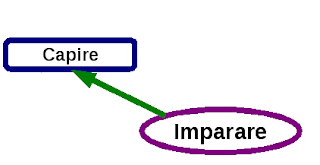One of the most important human capacity, capacity that even the school is able to inhibit completely
Learning What is learning? What do I mean when I say I learn? We can decompose the action into action to learn more "simple".

First, when you want to learn something you have to make sure it happens. Learning is first of all understand.

seems obvious that you want to learn to understand what is important, but it is not always the case. Sometimes you have not understood a topic and try to learn it. I remember a sentence spoken by a graduate student in psychology who had attended a high school: "I learned all the math, but I did not get for nothing." On rare occasions and for limited periods, you may want to try to "learn" something that is not understood, but this must be seen as an anomalous situation and must seek to remedy them as soon as possible.
understand is the first step in learning, learning is not simply understand. Fully understand an argument serves no useful purpose at all if not then it is stored:
must store several things: the general pattern, the various steps, the particular terms. Store is a different process from understanding. Sometimes we understand in a moment, but we want to save some time. There are different techniques to store and everyone has different styles memory. Some have better visual memory and find as effective tools to re-read the text, copy notes, build schemes. Some people have an auditory memory and find greater benefit to repeat aloud. The pace and concentration help a lot of memory.
Well "Before I knew, then I saved: I'm done now." No, not yet! After realizing
and stored there is another step to do: we must learn to apply the knowledge:
The deadline to apply is generic, depending on what we are learning, can mean:
-
Telling, try telling your little brother, or another person who loves you, the chapter of history that you learn, but just as you tell stories, or try to tell how to solve a problem ...
-
re-produce in the sense of producing again, to produce something new.
-
Use knowledge to solve problems.
-
...
Tip: do not abuse the patience of others, before trying to tell us something, make sure you have understood and memorized!
When learning is to a privileged, ranging from clear to the store to tell. But learning is a complex process, not linear. So it is to memorize a poem that allows us to understand more deeply and tell or re-produce helps to memorize and understand. I learned mathematics, not what I studied at university, but what I learned when he returned to the school. Each of the three activities is to support the other:
Learning is a complex task as the activities are complex to understand, memorize and use knowledge. The wretched diagram above certainly can not claim to be a complete model of the subject, but can be used to begin to know your learning style and to recognize, analyze and solve any difficulties in the study.
Intermezzo
Aphorism Prof. mate:
"To understand math sometimes you just listen carefully, a good lesson to learn math have to do much practicing "
Only in American films can be someone who is good at math to science infused in our world who is better at math devotes more time. Applies to any object of knowledge, eg:
-
only in fantasy can become good at playing an instrument if you use 10 minutes a week.
-
conversely, to write 100 sms per day brings in a few weeks with a great ability to use the keyboard of a mobile phone.
-
if you think you might not be brought math, try to solve 100 years to the day you'll see that you will become, in a few weeks, the first class!
Store
It's easy to say by heart, but we have different types of memories that work with different mechanisms:
The short-term memory is supported takes a few seconds, probably by electrical activity of the brain. It is what allows us to remember a phone number long enough to dial it, or words of a sentence to the time necessary to understand its meaning. The
medium-term memory lasts from 10 to 30 minutes, but then can disappear without a trace.
The long-term memory is permanent and can surprise bringing to mind so many vivid situations experienced years before.
Needless to say, when we study we must make sure that what we learn going to end up in long-term memory. Be very difficult to deposit knowledge in the medium-term memory is wasted effort: the day after and we do not remember anything to start over every time we get to study that subject doing a lot of unnecessary work.
Conclusion
Learning is an activity supported by three pillars: understand, memorize and apply. If you are missing one of these, learning collapsed. If you have difficulties in school, before saying "I'm stupid", check that the three pillars of learning, whether solid or if by chance there is to do some repairs or "in one of three stages.
Maybe, with limited intervention, be able to improve your results getting more satisfaction from what you do and stressing less who loves you.
.



